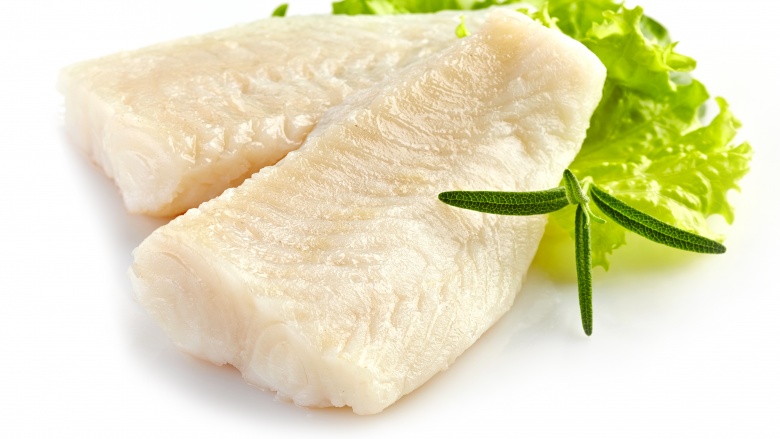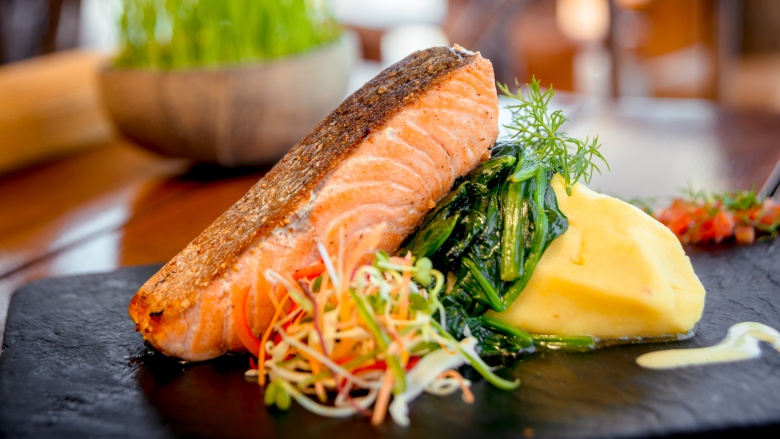Perfect Marinades For Every Type Of Meat
Got meat? If so, you definitely want to use a marinade to cook the perfect dish. Marinades have been used since ancient Roman cooks discovered they made meat juicy and delicious, and if marinades were good enough for Caesar, they're good enough for plebeians like us. Plus, once you see how easy the recipes are and how fabulous the food tastes, you'll want to use marinades all the time.
If you are new to marinating meat, we've assembled a great guide to the marinating process, but other than that, you just need to decide which meat you want to cook. To keep things simple, we've narrowed down the field by focusing on one perfect marinade for each of the most popular meats. So grab your apron and let's get to the meat of the matter.
Chicken
Chicken can be one of the easiest meats to cook, but it overcooks easily. When it does, it can be as dry and flavorless as a cardboard box. But don't let this ruffle your feathers because the right marinade can make something as mundane as a boneless, skinless chicken breast seem like a fancy meal. For the ultimate chicken marinade, use grilling guru Steven Raichlen's recipe. It's so easy to prepare you won't ever need another one. All you need is lemon juice, lemon zest, red pepper flakes, garlic, some mixed herbs and spices, olive oil, and coarse salt and pepper.
We love it because it keeps the meat moist during cooking, adds tons of flavor, and is versatile. It's perfect for roasting a whole chicken or grilling individual cuts. And with a few spice and herb switches, it makes a worthy base for low, slow barbecuing.
Use this recipe to conjure up a whole range of other marinades with global flavors. Give it an Asian twist by using lime instead of lemon, using only cilantro, substituting sesame oil for olive oil, and adding in a few Pacific Rim spices. Or consider switching out the oil, herbs, and spices to give them French, Italian, Scandinavian, or Spanish accents. With this simple marinade, the chicken world is your oyster.
Beef
Americans have a love affair with beef that is unrivaled. In 2015, our per capita consumption of beef was 53.9 pounds. You name it and we eat it—even the rarer parts, like Rocky Mountain oysters. Whether it's roasted, grilled, barbecued, corned, in hash, or skewered, we love beef with tons of flavor and melt-in-your-mouth tenderness. For tough cuts like flank steak, chuck, brisket, and shoulder, good cooks know the best way to achieve this tenderness is with a marinade—and some low, slow cooking—which releases that rich, beefy flavor everyone loves.
For lean cuts like tenderloin, filet mignon, and steak, chefs look for a marinade that can add much needed flavor and keep it moist during cooking. The recipe ingredients should impart flavors that play up but don't overpower the delicious natural umami flavors in beef. Balance is key to prevent meat from getting mushy from too much acid or getting greasy from too much oil.
For the perfect beef marinade, we found a recipe that has a bit of zest from spicy mustard, highlights the meat's natural beefiness by combining fermented condiments like soy sauce and Worcestershire sauce, and pairs perfectly with pungent, earthy garlic. A soupcon of lemon juice cuts through the fat and brightens up all the taste of the meat on your palate so you get a fantastic blend of textures, tastes, and aromas. This marinade recipe, like the chicken marinade, can easily be modified by switching out some ingredients to make the recipe fit a specific cuisine or cut of beef.
Pork
Experienced cooks know pork pairs naturally with apples, mustard, and thyme, and this marinade recipe from Rachael Ray has all of the above. When cooking pork, it's important to remember that it's a lean white meat that can easily dry out and become as unappealing as sawdust. (This fact is hard to forget if you've ever tasted dry pork.) A marinade that perks up the flavor while keeping the meat juicy is essential. Rachael Ray's recipe combines apple cider, lemon juice, Dijon mustard, thyme, olive oil, salt, and pepper to accomplish that goal.
This marinade is sure to become a favorite because you can use it on any cut of pork, you can easily adjust the seasoning to fit the cuisine or season, and it works well with chicken, too. Add a pinch of allspice and ground cinnamon to the marinade for fall and winter holiday menus, or go for a Mexican or Tex-Mex palate and switch out the thyme for cumin and chili powder with a bit of hot sauce in place of the mustard.
Lamb
Few cuisines have a repertoire of succulent, appealing lamb dishes like the French and Middle Eastern cuisines. Borrowing a bit from both cultures can be a fun way to make a fusion lamb marinade, but for style, versatility, and taste, nothing is as fantastic as lamb prepared a la Francaise. And for that, we rely on the woman who made French cuisine famous: Julia Child. Use this classic mustard marinade from Julia Child's favorite cookbook, The Way to Cook (it's her own, of course), for perfect lamb. You only need garlic, thyme, Dijon mustard, lemon juice, soy sauce, and olive oil.
Julia was the master of getting a recipe right, but she was also the queen of great-tasting food and she made sure every recipe worked perfectly every time. This recipe captures the je ne sais quoi of French cuisine with just a few key ingredients. But don't let the short list fool you: the combination of ingredients optimizes the lamb's naturally earthy flavors and opulent richness and lets the meat shine as the main attraction. Use this recipe to marinate elegant lamb chops, roasts, leg of lamb, and lamb shanks and you will be amazed at the irresistibly tender meat. Try it with beef and pork roasts, too. It's absolutely magnifique!
Fish (white meat)
Any experienced fishmonger worth their salt will tell you the less you do to fish before and during cooking, the better the finished dish will be. This is because there are so many variations in color, taste, texture, type of meat, and fat content. The best marinades take this into account and can be divided into two main groups that roughly correspond to two main types of fish. There are light, delicate, and lean fish with white meat like trout, flounder, and snapper, and there are meatier, fattier fish with dark meat like tuna, salmon, and sardines.
This excellent recipe from an Alaskan fishing company is perfect for lean, white meat fish. You'll need olive oil, garlic, lemon juice, pepper, and fresh herbs. It's great because the recipe doesn't include salt, which could dry out the fish, and the amount of lemon is kept in check to prevent "cooking" the fish during marinating. Be sure not to marinate the fish for more than 30 minutes, or you'll end up with ceviche.
Fish (dark meat)
But maybe you don't like those lighter fish, or you just feel like having a heartier meal tonight? Aim for the heavy hitters in the fish world, like tuna and salmon.
Unlike the leaner white meat fish, fish with a higher fat content can handle a wider variety of ingredients. They can also be marinated for a bit longer, and they taste absolutely smashing with more robust seasoning. Asian cuisine and spices are a no-brainer with this type of fish, and while this Asian marinade recipe from Epicurious calls for salmon, the recipe works just as well with tuna and other fatty fish. You'll need brown sugar, soy sauce, hoisin sauce, ginger, red pepper flakes, garlic, and lime juice.
Don't be afraid to customize it to suit Thai, Chinese, Korean, or other Asian palates. You can also experiment with other Asian spices or you can incorporate fresh herbs like cilantro and Chinese basil. This recipe is perfect for fattier fish because the use of citrus acts as a foil to the heavier fat content and offers a clean bright flavor to counteract any potential fishiness. And you'll love the caramelized glaze that coats the fish during cooking, thanks to the brown sugar, which is nicely contrasted by the zippy citrus and ginger. Enjoy!






